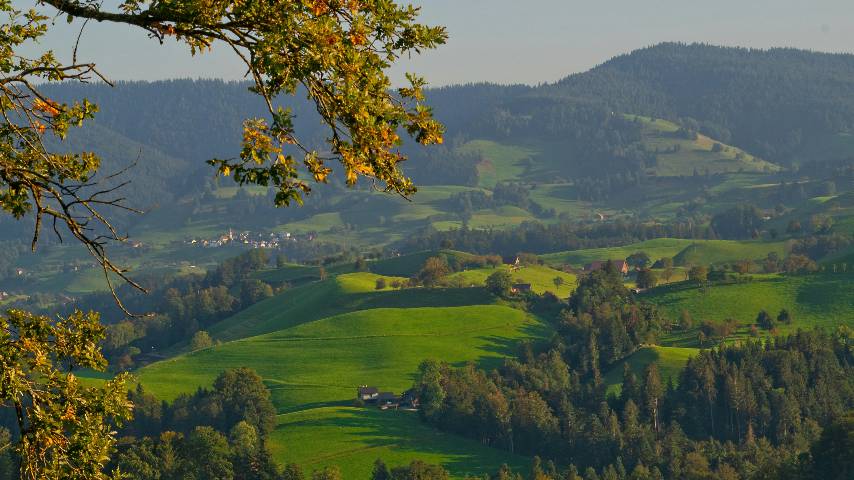“Finally, I wished to see what the successful Communists had made of their lives ; what was the effect of communal living upon the character of the individual man and woman ; whether the life had broadened or narrowed them ; and whether assured fortune and pecuniary independence had brought to them a desire for beauty of surroundings and broader intelligence : whether, in brief, the Communist had any where become something more than a comfortable and independent day-laborer, and aspired to something higher than a mere bread-and-butter existence.”
–Charles Nordhoff, The Communistic Societies of the United States: From Personal Visit and Observation
“Those who labor in the earth are the chosen people of God…”
–Thomas Jefferson
How do we live together in light of free will? This is a question philosophers and political theorists have attempted to answer throughout the years, with varying degrees of success. Some, like 17th century philosopher Thomas Hobbes, would say, “Why, create a State to protect everyone’s interests!” But, who is “everyone”? And, what are their interests? What happens when these interests collide, conflict and intersect? These subsequent concerns, answered unsatisfactorily by societies throughout time, have also been answered by smaller groups, hermetic, separatist and intentional communities, who sought to free themselves from whatever social ills were present in the hegemonic systems of their era. The trouble is—living together is not an easy task, whether on an idyllic piece of farmland or in a crowded apartment building. The even greater trouble is, without deep awareness and an abundance of accountability, anyone can replicate the harms they thought they were running away from.
Communal groups, like the community in The Burning Cauldron of Fiery Fire, offer an antidote to historical, seemingly immovable, structures. They chart paths forward beyond what history and generational patterns tell us our fate will be. But, in so many cases, the path can only be as radical as ego and nervous system patterning allows. Thomas Jefferson’s middle-class agrarian vision for the country, which sounds an awful lot like a commune, was devoured by his own dependance on enslaved labor. The infamous Oneida community became a place for sexual violation and dubious interpersonal politics. However, for every case of hypocrisy, there is a counterbalance, like The Farm in Tennessee or Ten of Cups Farm in Washington State. Both places commit to the work of personal, communal change, and systemic change, rather than trying to build upon the ruins of misogyny and racism.
Burning Cauldron and Anne Washburn jump into this existential tangle headfirst. As the play’s characters, who live in an intentional community in California, attempt to create a life outside war-mongering and consumerism, they simultaneously attempt to do the impossible: to live outside of history. The history they’re fleeing is personal, emerging in the wake of tragedy, but it is also larger, older, ancient, woven of America’s history and the history of humankind in general, which is for better or worse, one of disappointment, patchy, imperfect love and other broken tools, like money and empathy. There are no neat solutions, but the story knocks at the door of the inferno nonetheless, broaching questions in whispers, jokes, startling revelations, contradictions and the inimitable presence of Lula the Pig (some pig!).
I think, having been in my fair share of spaces claiming the royal robes of intentionality, that it would behoove us all to consider the social structures we live under and what alternatives might exist. Though it feels sometimes that we don’t have power to shift the political tides, each of us has the ability to create a collectivity that is reflective of our humanity rather than in opposition to it. Through the tiny choices we make, the lies we choose to tell or not tell, the way we choose to fall in love with what could injure us, but could also save us, we prove that we are in fact capacious enough to do the work of living together. In the negative space between our ideals and our reality, a muscle develops, one that allows us to see what is without crumbling, to make what does not yet exist without cutting corners. That is the rub of Burning Cauldron, of intentional communities, of the Nation State, and of us each individual particles who make up the Big Whole: what is dead or dying or unresolved must be faced in ways big and small. We cannot make a new world in the half dead carcass of the old one. The past, laid to rest with dignity, can fertilize a beautiful present, but the past covered in flowers and lies will only serve to haunt the future. ✦
Extended Play is a project of The Civilians. To learn more about The Civilians and to access exclusive discounts to shows, visit us and join our email list at TheCivilians.org.









